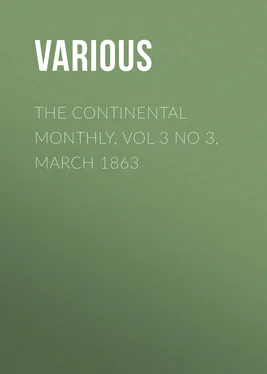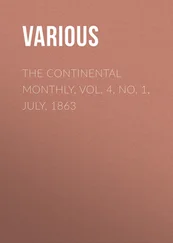Various - The Continental Monthly, Vol 3 No 3, March 1863
Здесь есть возможность читать онлайн «Various - The Continental Monthly, Vol 3 No 3, March 1863» — ознакомительный отрывок электронной книги совершенно бесплатно, а после прочтения отрывка купить полную версию. В некоторых случаях можно слушать аудио, скачать через торрент в формате fb2 и присутствует краткое содержание. Жанр: foreign_antique, periodic, Языкознание, Политика, foreign_edu, на английском языке. Описание произведения, (предисловие) а так же отзывы посетителей доступны на портале библиотеки ЛибКат.
- Название:The Continental Monthly, Vol 3 No 3, March 1863
- Автор:
- Жанр:
- Год:неизвестен
- ISBN:нет данных
- Рейтинг книги:5 / 5. Голосов: 1
-
Избранное:Добавить в избранное
- Отзывы:
-
Ваша оценка:
- 100
- 1
- 2
- 3
- 4
- 5
The Continental Monthly, Vol 3 No 3, March 1863: краткое содержание, описание и аннотация
Предлагаем к чтению аннотацию, описание, краткое содержание или предисловие (зависит от того, что написал сам автор книги «The Continental Monthly, Vol 3 No 3, March 1863»). Если вы не нашли необходимую информацию о книге — напишите в комментариях, мы постараемся отыскать её.
The Continental Monthly, Vol 3 No 3, March 1863 — читать онлайн ознакомительный отрывок
Ниже представлен текст книги, разбитый по страницам. Система сохранения места последней прочитанной страницы, позволяет с удобством читать онлайн бесплатно книгу «The Continental Monthly, Vol 3 No 3, March 1863», без необходимости каждый раз заново искать на чём Вы остановились. Поставьте закладку, и сможете в любой момент перейти на страницу, на которой закончили чтение.
Интервал:
Закладка:
The fall of Islamism does not imply the downfall of Turkish rule. The one is religious, the other a civil power; the one may wane, the other rise.
The wars which brought the European powers in Turkish waters made a deep impression upon the Turks, and convinced them that they had been rescued from annihilation by foreign arms. This led to an important measure, viz.: the promulgation of the imperial edict of 1850, which was translated into all the languages of the empire, and read in all the mosques and churches. Besides securing the freedom of conscience and the equality of rights, it grants the right of apostasy, which had hitherto been a capital offence: 'As all forms of religious worship are and shall be freely professed in the empire, no person shall be hindered in the practice of the religion which he professes; nor shall he in any way be annoyed in this kind: in the matter of a man changing his religion, and joining another, no force shall be applied to him.' The decree bore directly upon Islamism. Turks, both private and official, now discuss freely the doctrines of the New Testament. The Bible, to-day, is widely circulated among the Turks. About seven thousand copies are sold annually to Mohammedans, while ten years ago they would not have been accepted as gifts. By all classes of people the Bible is purchased, read, and made the subject of discussion. The sultan himself reads it. Discussion leads to investigation, and investigation to the establishment of truth. This is one of the causes that have been silently at work, destined to effect the fall of Islamism.
In all parts of the empire, the Christian element is growing stronger and stronger; the Mohammedan weaker. Even in Asia, the chosen abode of the faithful, we find Christian cities and villages prosperous, and Mohammedan cities falling to decay. In another century the Sublime Porte will depend chiefly on the Christian element for its influence. To-day, the Mussulman mosque, the pagoda of the Hindoo, the fire temple of the Parsee, the Roman and Greek churches, meet together.
The adoration and prostrations of the Turk afford an imposing sight even to the Christian. 'Praises be to God, for He is great,' resounds at sunrise and at sunset, from ship to ship at sea, from kiosk to minaret on land.
According to the Koran, there is a paradise for all true believers. This paradise, Al Janat, signifies a pleasure garden, from which flows a river, the river of life, whose water is clear as crystal, cold as snow, and sweet as nectar. The believer who takes a draught shall thirst no more. Even the oriental imagination fails to describe the glories of this paradise—its fountains and flowers, pearls and gems, nectar and ambrosia, all in unmeasured profusion. To crown the enchantment of the place, to each faithful Moslem is allotted seventy-two houris, resplendent beings, free from every human defect, perpetually renewing their youth and beauty. Such is the Mohammedan conception of the future world.
The Turks, in common with other Mohammedans, believe in angels, and in the prophets Adam, Noah, Moses, and Jesus . One might suppose that such a belief would assist missionaries in converting the infidel; but far from assisting, its tendency is to make more difficult the inculcation of Christian doctrines. When asked to accept the religion of Christ, the Turk's ready answer is: 'We believe in Jesus! we believe in him already; you know only a part of the true faith; Mohammed has superseded Jesus.' Notwithstanding this, many Turks in Europe and Asia believe that in a long series of years, Jesus will return to earth, reanimate their faith and ancient valor, and with one unbroken religion, give them dominion to the end of the world. They, in short, expect Jesus—the same Jesus whom Christians worship—in the fullness of time to accomplish the work which their prophet only began. Christian missionaries should avail themselves of this remarkable belief, and turn it to the spiritual advantage of those who entertain it.
'Let the Turkish Government remain, if by her standing Islamism may fall! that we may carry back a purer literature to the land of Homer, a purer law to the land of Moses, and the Gospel of Christ to the land of the apostles.'
It only remains for me to say one word in regard to the now reigning sovereign. The ulemas—who have become what the Janissaries were, the hotbed of fanaticism—in their endeavors to overthrow the late sultan, Abdul Medjid, looked upon the present sultan as their champion. If he permits himself to become a tool in their hands, Turkey will lose during his reign what she gained in a century. If, on the other hand, he has the energy of Mahmoud, the humanity of Selim, and practises the conciliatory policy of his brother, a glorious future awaits the empire.
FALSE ESTIMATIONS
As one, who under pay of priest or pope,
Painteth an altar picture boldly bad,
Yet winning worship from the common eye,
Is less than one, who faltering day by day
Before the untouched canvas, dreams, and feels
An unaccomplished greatness: so is he
Who scrapes the skies and cleaves the patient air
For rhyming ecstasies to cheat the crowd,
That sees not in the stiller worshipper
The truer genius, who, in heights lone lost,
Forgets to interpret to a lesser sense.
O there do dwell among us minds divine,
In which th' etherial is so subtly mixed,
That only matter in its outward mien
To the observer shows. Such ever live
Unto themselves alone, in sweet still lives,
And die by all men misinterpreted.
Within a churchyard rise two honored urns
O'er graves not far removed. The one records
The 'genius of a Poet,' whose fitter fame
Lies in the volumes which his facile pen
Filled with the measure of redundant verse:
Before this urn the oft frequented sod
Is flattened with the tread of pensive feet.
The other simply bears the name and age
Of one who was 'a Merchant,' and bequeathed
A fair estate with numerous charities:
Before this urn the grass grows rank and green.
I knew them both in life, and thus to me
They measured in their lives their effigies:
He who the pen did wield with facile power,
Created what he wrote, and to the ear
With tact, not inspiration, wrought the sounds
To careful cadence; but the heart was cold
As the chill marble where the sculptor traced
Curious conceits of fancy. Let him pass,
His name not undervalued, for his fame
Shall in maturer ages lie as still
As doth his neighbor's now.
Turn we to him.
He was a man to whom the general eye
Bent with the confidence of daily trust
In things of daily use: a man 'of means,
—Sagacious, honest, plodding, punctual,—
Revolving in the rank of those whose shields
Bear bags of argent on a field of gold,
His life, to most men, was what most men's are,—
Unceasing calculation and keen thrift;
Unvarying as the ever-plying loom,
Which, moving in same limits day by day,
Weaves mesh on mesh, in tireless gain of goods.
But I, that knew him better than the herd,
Yet saw him less, knew that in him which lives
Still gracious and still plentiful to me
Now he hath passed away from me and them.
This man, whose talk on busy marts to men
Teemed with the current coin of thrifty trade,
—Exchanges, credits, money rates, and all,—
Hath stood with me upon a silent hill,
When the last flush of the dissolving day
Fainted before the moonlight, and, as 'twere
Unconscious of my listening, uttered there
The comprehensions of a soul true poised
With elemental beauty, giving tongue
Unto the dumbness of the blissful air.
So have I seen him, too, within his home,
When, newspaper on knee, his earnest gaze
Seemed scanning issues from the money list;
But comments came not, till my curious eye
Led out his meditation into words,
Thought-winding upward into sphery light,
So utterly unearthly and sublime,
That all the man of fact fled out of sense,
And visual refinement filled the space.
Oft hath he told me, nothing was so blind
As the far-seeing wisdom of the world,
And none within it knew him, save himself,
And that so scantily, that but for faith
In a redeeming knowledge yet to come,
He would lie down and let his weakness die
In self-reclaiming dust.
Интервал:
Закладка:
Похожие книги на «The Continental Monthly, Vol 3 No 3, March 1863»
Представляем Вашему вниманию похожие книги на «The Continental Monthly, Vol 3 No 3, March 1863» списком для выбора. Мы отобрали схожую по названию и смыслу литературу в надежде предоставить читателям больше вариантов отыскать новые, интересные, ещё непрочитанные произведения.
Обсуждение, отзывы о книге «The Continental Monthly, Vol 3 No 3, March 1863» и просто собственные мнения читателей. Оставьте ваши комментарии, напишите, что Вы думаете о произведении, его смысле или главных героях. Укажите что конкретно понравилось, а что нет, и почему Вы так считаете.












